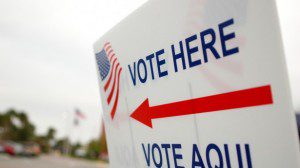A federal judge who struck down part of a controversial state elections law will hold a hearing Wednesday morning on whether to issue a temporary restraining order in a separate case concerning a state-ordered voter purge.
The U.S. Department of Justice has asked U.S. District Judge Robert Hinkle to bar elections officials from removing any suspected non-citizens from the rolls by using an inaccurate state database at the center of the effort. The state argues that no voters are currently in danger of being pushed off and that the courts should wait to rule on the case.
Wednesday’s arguments will mark the first major courtroom battle in a complicated legal fight over the purge. The Justice Department has sued the state over the initiative, saying it violates the National Voter Registration Act and that Florida should have sought permission from federal officials.
All major changes to election procedures have to be approved under the Voting Rights Act before going into effect in five counties with a history of voting discrimination.
At the same time, the state has sued the Department of Homeland Security in an effort to gain access to a federal database that elections officials say would make the purge more accurate. DHS says the state hasn’t provided it with enough information to use the database.
In its brief in the purge case, the Department of Justice argues that the voter purge runs afoul of a provision of the NVRA that bars removing voters from the rolls for all but a handful of reasons in the 90 days before a federal election. The state’s primaries are scheduled for Aug. 14.
“In light of the foregoing, the state cannot ignore the requirements of the NVRA simply because it disagrees with the balance Congress struck between the need for accurate and current voter rolls and protections to prevent harms to voters caused by voter removal programs,” the filing says.
But the state has fired back, saying that the program has effectively been stalled by the questions about its legality, meaning that an emergency order by the court isn’t necessary. And it vigorously defends the scrubbing of the rolls.
“DOJ’s newfound haste in seeking a TRO is completely unwarranted, as defendants are not currently taking any action that could cause any injury to voters, let alone irreparable injury,” the state argued in its response. “At best, DOJ’s request for a TRO appears to be based on a misunderstanding of the facts, which could have been avoided had it engaged in the required conferral with defendants.”
The federal government says it did notify the state that it would ask for the restraining order.
Lawyers for the state also argued that the portion of the law that lists the reasons for removing voters from the rolls in the 90-day timeframe also bars removal of voters for any reason except for those listed or an address change.
“In short, on any reading of the NVRA, a state may either remove non-citizens from the rolls at any time, or not at all,” the filing says. “It is self-evident which of these results Congress intended.”
Hinkle has already ruled against the state in one case that is part of a months-long battle over voter registration ahead of a November presidential election in which Florida’s electoral votes could be key. He struck down portions of a law regulating voter-registration organizations, most notably a provision requiring voter registration forms to be returned to elections officials within 48 hours of being filled out.
The state could still appeal that decision.
by Brandon Larrabee



